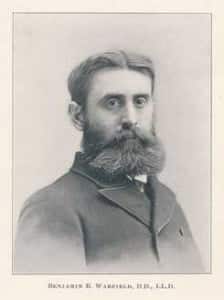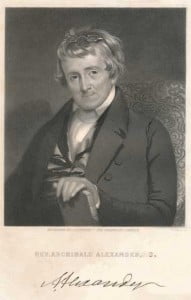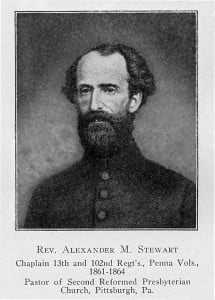It was on this day, April 20th, in 1880 that the Rev. Dr. Benjamin Breckinridge Warfield, at the age of twenty-nine, was inaugurated as Professor of New Testament Exegesis and Literature at the Western Theological Seminary, Pittsburgh, Pennsylvania. We take as the text of our post today the introductory part of Warfield’s inaugural lecture. A link follows at the close of this section for those who would like to read the whole of the lecture. Not every modern day seminary retains this tradition of the inaugural sermon or address, though it is a fine tradition and one which we find profit in and hope will continue.
First, Barry Waugh provides us with a fitting introduction, setting the stage for our post today:
 “In September of 1878, Benjamin began his career as a theological educator when he became an instructor in New Testament Literature and Exegesis at Western Theological Seminary in Pittsburgh. Western Seminary had been formed by the merger of existing seminaries including Danville Seminary, which R. J. Breckinridge, Benjamin’s grandfather, had been involved in founding. The following year he was made professor of the same subject and he continued in that position until 1887. In his inaugural address for Professor of New Testament Exegesis and Literature, April 20, 1880, he set the theme for many of his writing efforts in the succeeding years by defending historic Christianity. The purpose of his lecture was to answer the question, “Is the Church Doctrine of the Plenary Inspiration of the New Testament Endangered by the Assured Results of Modern Biblical Criticism.” Professor Warfield affirmed the inspiration, authority and reliability of God’s Word in opposition to the critics of his era. He quickly established his academic reputation for thoroughness and defense of the Bible. Many heard of his academic acumen and his scholarship was awarded by eastern academia when his alma mater, the College of New Jersey, awarded him an honorary D. D. in 1880.”
“In September of 1878, Benjamin began his career as a theological educator when he became an instructor in New Testament Literature and Exegesis at Western Theological Seminary in Pittsburgh. Western Seminary had been formed by the merger of existing seminaries including Danville Seminary, which R. J. Breckinridge, Benjamin’s grandfather, had been involved in founding. The following year he was made professor of the same subject and he continued in that position until 1887. In his inaugural address for Professor of New Testament Exegesis and Literature, April 20, 1880, he set the theme for many of his writing efforts in the succeeding years by defending historic Christianity. The purpose of his lecture was to answer the question, “Is the Church Doctrine of the Plenary Inspiration of the New Testament Endangered by the Assured Results of Modern Biblical Criticism.” Professor Warfield affirmed the inspiration, authority and reliability of God’s Word in opposition to the critics of his era. He quickly established his academic reputation for thoroughness and defense of the Bible. Many heard of his academic acumen and his scholarship was awarded by eastern academia when his alma mater, the College of New Jersey, awarded him an honorary D. D. in 1880.”
INAUGURAL ADDRESS
by
PROF. BENJAMIN B. WARFIELD.
Fathers and Brothers:
It is without doubt a very wise provision by which, in institutions such as this, an inaugural address is made a part of the ceremony of induction into the professorship. Only by the adoption of some such method could it be possible for you as the guardians of this institution, responsible for the principles here inculcated, to give to each newly-called teacher an opportunity to publicly declare the sense in which he accepts your faith and signs your standards. Eminently desirable at all times, this seems particularly so now, when a certain looseness of belief (inevitable parent of looseness of practice) seems to have invaded portions of the Church of Christ,—not leaving even its ministry unaffected;—when there may be some reason to fear that “enlightened clerical gentlemen may sometimes fail to look upon subscription to creeds as our covenanting forefathers looked upon the act of putting their names to theological documents, and as mercantile gentlemen still look upon the endorsement of bills.”* [*Peter Bayne in The Puritan Revolution.] And how much more forcibly can all this be pled when he who appears before you at your call, is young, untried, and unknown. I wish, therefore, to declare that I sign these standards not as a necessary form which must be submitted to, but gladly and willingly as the expression of a personal and cherished conviction; and, further, that the system taught in these symbols is the system which will be drawn out of the Scriptures in the prosecution of the teaching to which you have called me,—not, indeed, because commencing with that system the Scriptures can be made to teach it, but because commencing with the Scriptures I cannot make them teach anything else.
This much of personal statement I have felt it due both to you and myself to make at the outset; but having done with it, I feel free to turn from all personal concerns.
In casting about for a subject on which I might address you, I have thought I could not do better than to take up one of our precious old doctrines, much attacked of late, and ask the simple question : What seems the result of the attack? The doctrine I have chosen, is that of “Verbal Inspiration.” But for obvious reasons I have been forced to narrow the discussion to a consideration of the inspiration of the New Testament only; and that solely as assaulted in the name of criticism. I wish to ask your attention, then, to a brief attempt to aupply an answer to the question :
IS THE CHURCH DOCTRINE OF THE PLENARY INSPIRAITON OF THE NEW TESTAMENT ENDANGERED BY THE ASSURED RESULTS OF MODERN BIBLICAL CRITICISM?
At the very out-set, that our inquiry may not be a mere beating of the air, we must briefly, indeed, but clearly, state what we mean by the Church Doctrine. For, unhappily, there are almost as many theories of inspiration held by individuals as there are possible states imaginable between the slightest and the greatests influence God could exercise on man. It is with the traditional doctrine of the Reformed Churches, however, that we are concerned; and that we understand to be simply this :—Inspiration is that extraordinary supernatural influence (or, passively, the result of it,) exerted by the Holy Ghost on the writers of the Sacred Books, by which their words were rendered also the words of God, and, therefore, perfectly infallible. In this definition, it is to be noted: 1st, That this influence is a supernatural one—something different from the inspiration of the poet or man of genius. Luke’s accuracy is not left by it with only the safeguards which “the diligent and accurate Suetonius” had. 2d. That it is an extraordinary influence—something different from the ordinary action of the Spirit in the conversion and sanctifying guidance of believers. Paul had some more prevalent safeguard against false-teaching than Luther or even the saintly Rutherford. 3d. That it is such an influence as makes the words written under its guidance, the words of God; by which is meant to be affirmed an absolute infallibility (as alone fitted to divine words), admitting no degrees whatever—extending to the very word, and to all the words. So that every part of Holy Writ is thus held alike infallibly true in all its statements, of whatever kind.
Fencing around and explaining this definition, it is to be remarked further:
1st. That it purposely declares nothing as to the mode of inspiration. The Reformed Churches admit that this is inscrutable. They content themselves with defining carefully and holding fast the effects of the divine influence, leaving the mode of divine action by which it is brought about draped in mystery.
2d. It is purposely so framed as to distinguish it from revelation;—seeing that it has to do with the communication of truth not its acquirement.
3d. It is by no means to be imagined that it is meant to proclaim a mechanical theory of inspiration. The Reformed Churches have never held such a theory* [*See Dr. C. Hodge’s Systematic Theology, pFW `57, volume I]; though dishonest, careless, ignorant or over-eager controverters of its doctrine have often brought the charge. Even those special theologians in whose teeth such an accusation has been oftenest thrown (e.g., Gaussen) are explicit in teaching that the human element is never absent. The Reformed Churches hold, indeed, that every word of the Scriptures, without exception, is the word of God; but, alongside of that, they hold equally explicitly that every word is the word of man. And, therefore, though strong and uncompromising in resisting the attribution to the Scriptures of any failure in absolute truth and infallibility, they are before all others in seeking, and finding, and gazing on in loving rapture, the marks of the fervid impetuosity of a Paul—the tender saintliness of a John—the practical genius of a James, in the writings which through them the Holy Ghost has given for our guidance. Though strong and uncompromising in resisting all efforts to separate the human and divine, they distance all competitors in giving honor alike to both by proclaiming in one breath that all is divine and all is human. As Gaussen so well expresses it, “We all hold that every verse, without exception, is from men, and every verse, without exception, is from God;” “every word of the Bible is as really from man as it is from God.”
4th. Nor is this a mysterious doctrine—except, indeed, in the sense in which everything supernatural is mysterious. We are not dealing in puzzles, but in the plainest factcs of spiritual experience. How close, indeed, is the analogy here with all that we know of the Spirit’s action in other spheres! Just as the first act of loving faith by which the regenerated soul flows out of itself to its Saviour, is at once the consciously-chosen act of that soul and the direct work of the Holy Ghost; so, every word indited under the analogous influence of inspiration was at one and the same time the consciously self-chosen word of the writer and the divinely-inspired word of the Spirit. I cannot help thinking that it is through failure to note and assimilate this fact, that the doctrine of verbal inspiration is so summarily set aside and so unthinkingly inveighed against by divines otherwise cautious and reverent. Once grasp this idea, and how impossible is it to separate in any measure the human and divine. It is all human—every word, and all divine. The human characteristics are to be noted and exhibited; the divine perfection and infallibility, no less.
This, then, is what we understand by the church doctrine:—a doctrine which claims that by a special, supernatural, extraordinary influence of the Holy Ghost, the sacred writers have been guided in their writing in such a way, as while their humanity was not superseded, it was yet so dominated that their words became at the same time the words of God, and thus, in every case and all alike, absolutely infallible.
— We will close there before Professor Warfield begins to get into the heart of his discourse. If you would like to read the whole of his inaugural discourse, click here.



 My favorite story about the military chaplaincy was that of an unnamed Union chaplain who must have been tired of marching with his troops. So upon entering the Confederate states, he stole the first horse he found on a farm. The Southern farmer, upset about the loss of his horse, complained to the Union Colonel. The latter ordered the chaplain to explain himself about this horse. He answered by saying that Jesus Christ had borrowed a donkey to go to Jerusalem! Whereupon the Colonel made four short points back to the chaplain. One, he wasn’t Jesus Christ. Two, a donkey is not a horse. Three, the regiment was going to Richmond, not Jerusalem. And last, the sooner he returned the horse, the better it would be for him. The horse was returned in short order.
My favorite story about the military chaplaincy was that of an unnamed Union chaplain who must have been tired of marching with his troops. So upon entering the Confederate states, he stole the first horse he found on a farm. The Southern farmer, upset about the loss of his horse, complained to the Union Colonel. The latter ordered the chaplain to explain himself about this horse. He answered by saying that Jesus Christ had borrowed a donkey to go to Jerusalem! Whereupon the Colonel made four short points back to the chaplain. One, he wasn’t Jesus Christ. Two, a donkey is not a horse. Three, the regiment was going to Richmond, not Jerusalem. And last, the sooner he returned the horse, the better it would be for him. The horse was returned in short order.